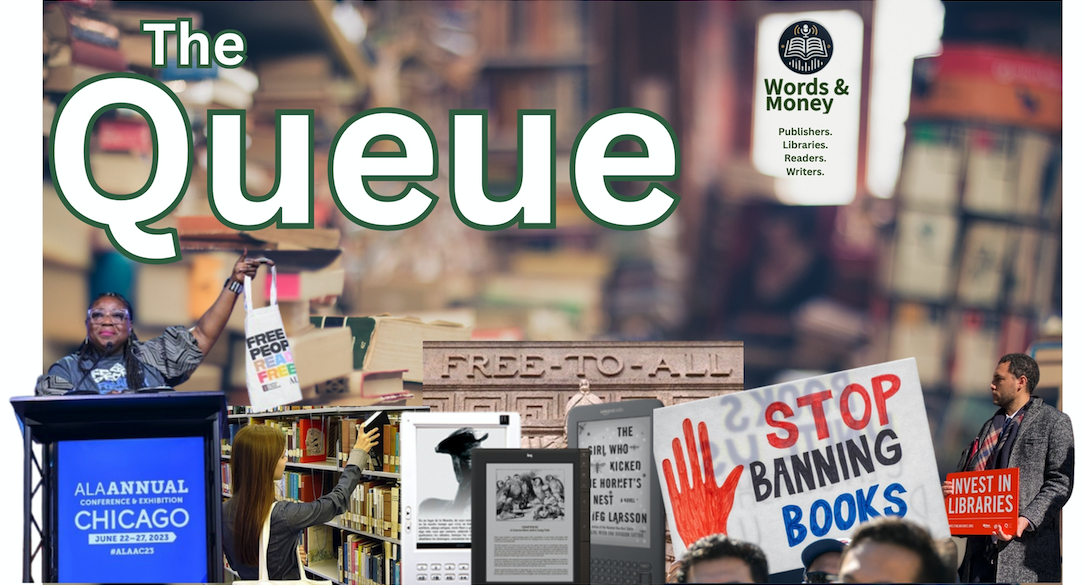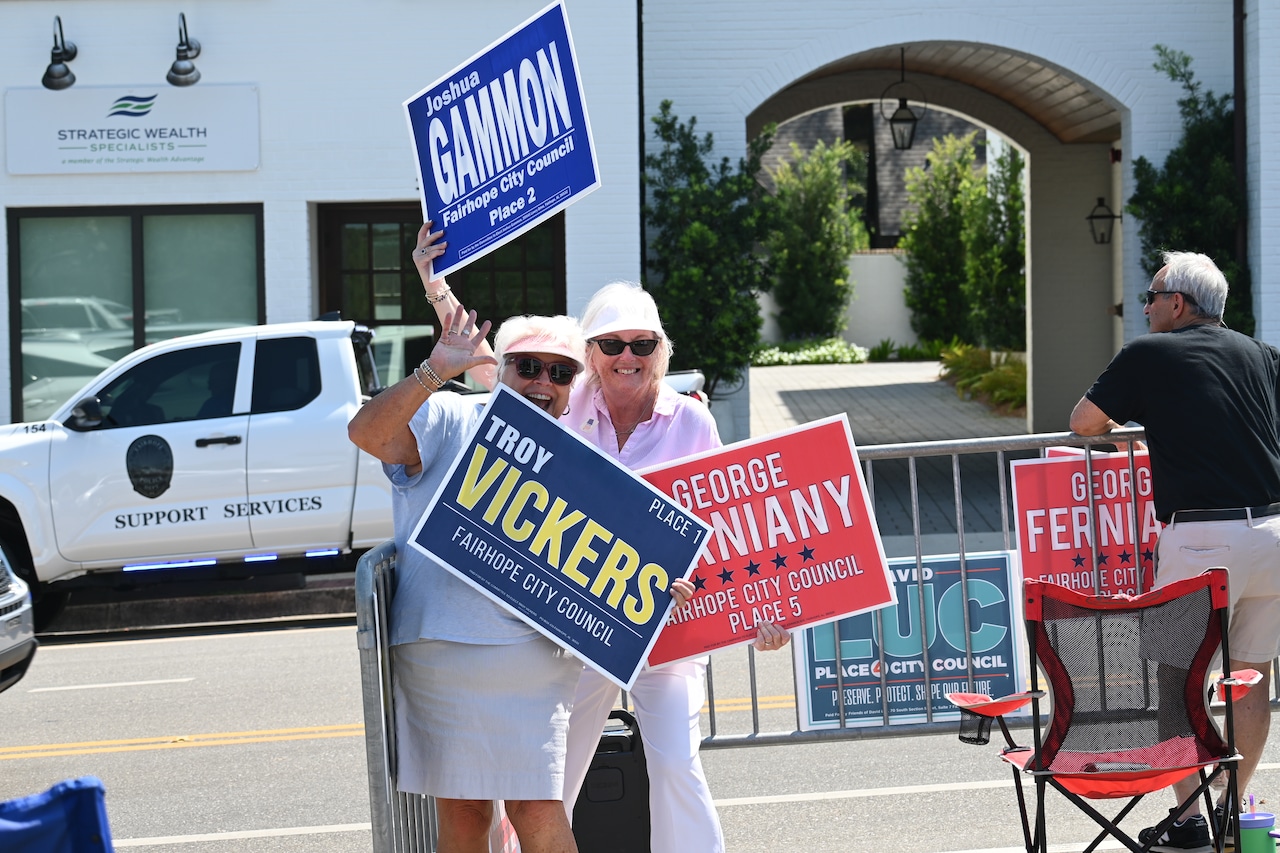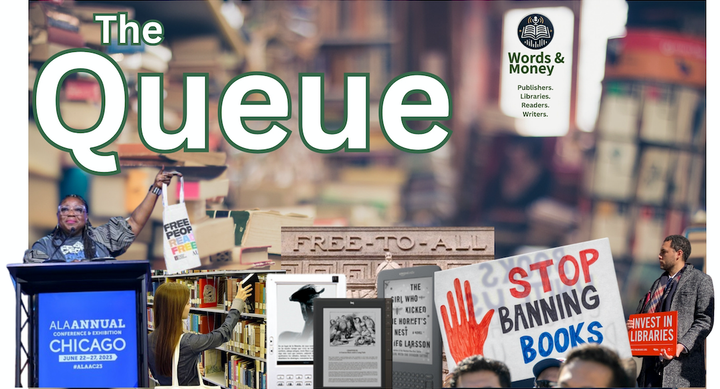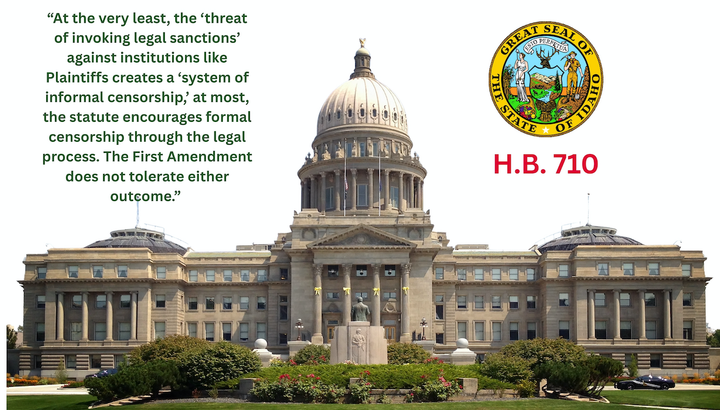The Queue: Library News for the Week Ending August 29, 2025
Among the week's headlines: Penguin Random House voices its commitment to defending the freedom to read; voters in Alabama rebuke would-be book banners; the American Library Project visits Oregon; and Geraldine Brooks wins the Library of Congress's Prize for American Fiction.

In the publishing industry, there has perhaps been no bigger defender of the freedom to read than Penguin Random House. The publisher has devoted significant resources to library community efforts, as well as to funding and organizing several lawsuits, as well as legislative and policy efforts around the globe, including a school library program in the U.K. and the recent passage of Rhode Island's landmark Freedom to Read Act in the U.S. And in a sign of the publisher's ongoing dedication to the cause, CEO Nihar Malaviya this week celebrated the company's efforts as part of a mid-year memo to staff.
"Through the changing market conditions, our belief in the right to read and the importance of literacy remains steadfast," Malaviya wrote to staff. "In the United States, we were named one of TIME100’s Most Influential Companies of the year for our battle against book bans. And just a few weeks ago, we had more good news on the book-banning front when we won a historic lawsuit against the state of Florida. These are just two examples of how our teams around the world are successfully working to get more books into more readers’ hands. These wins matter. So does the day-to-day work of publishing, championing, and selling books across every format, genre, and market. Together, they define who we are and what we stand for."
Meanwhile, on the one year anniversary of its lawsuit over HB 1069 in Florida, which was first filed on August 29, 2024, the company could soon see a little of its investment in defending the freedom to read come back to them.
In a filing this week, PRH and its co-plaintiffs in the case (including the other Big Five publishers and Sourcebooks) filed a motion to recover their legal fees and costs, seeking more than $1 million from the state of Florida. "As the definitive prevailing parties, Plaintiffs are entitled to attorneys’ fees and nontaxable expenses totaling $1,032,000," the brief states.
Any award is not likely to come soon, given the state's vow to appeal. But the effort to recover legal fees makes an important point that extends beyond Florida: such sweeping censorship efforts are not only misguided, but costly.
S&S CEO Jonathan Karp to Step Down, Return to Editing with New Imprint

In other Big Five publishing news, Simon & Schuster CEO Jonathan Karp is stepping down after an eventful five years as CEO. He will return to editing with a new imprint, SimonSix.
No question, it has been an intense five years for Karp, who was named CEO in May 2020 after the sudden death of Carolyn Reidy. Karp navigated the company through the pandemic, leading the publisher to record sales (with a big assist to Colleen Hoover) as well as through a failed merger with Big Five rival Penguin Random House, and its eventual sale to private equity firm KKR (which also owns leading library ebook provider OverDrive).
With Simon Six, Karp, a celebrated editor who before joining S&S founded the imprint Twelve at Hachette, which was a bestseller machine, will now work with Simon & Schuster’s existing imprints to publish six books a year. “As the founding publisher of Twelve, I published one book per month,” Karp said. “For Simon Six, I will acquire and edit half as many books each year and publish them with twice as much emphasis, in partnership with many of the same colleagues I’ve enjoyed working alongside for years.”
In Alabama, Voters Rebuke Would-Be Censors

Via AL.com, voters in the Alabama city of Fairhope have delivered more proof that the current surge in book bans is unpopular and being driven by a vocal minority.
"A slate of candidates endorsed by conservative political activists concerned about the city’s library was largely defeated during Tuesday night’s election," AL.com reports, noting that only one of the candidates endorsed by a conservative activist and former chapter president of Moms for Liberty won their race. "While the rest of the county’s elections have largely centered around steep population growth and managing the ensuing development, Fairhope’s election was primarily based on the library controversy that has plagued the town for nearly a year."
Also at AL.com, this week, an editorial on what Judge Carlos E. Mendoza's recent decision on HB 1069 in Florida portends for Alabama's efforts to censor library books.

"Mendoza made it clear that the only blanket prohibition the government can place on library materials for minors is that which aligns with the Miller-for-minors test. But the APLS code goes far outside that scope by ignoring the requirement that the material be looked at as a whole," the editorial notes. "It takes an overbroad approach to denying all descriptions of sexual intercourse, no matter the context, no matter how brief."
More on Michigan Librarian's Lawsuit Over Right Wing Parent's Harassment

Via Bridge Michigan, an update on librarian Christine Beachler's lawsuit over the alleged harassment she endured at the hands of a local parent.
“This lawsuit is not about book bans,” Beachler told Bridge Michigan. “This (behavior) is going on in other districts in Michigan and across the country. I felt like it was time for an educator to stand up against it.” Meanwhile, attorneys for for the defendant, Stafanie Boone, have filed a response and a counterclaim accusing Beachler of introducing books to minors that promote her own political agenda.
Beachler told the outlet the counterclaim against her "has absolutely no merit" and that she looks forward to "addressing these ridiculous allegations through the court."
Politics and the Library

Via Philadelphia Magazine, an interesting piece on how younger librarians view the library and librarianship.
"Librarianship, at its core, isn’t just about books, says Sophie Tessier, a 26-year-old reference librarian at a law library in Philadelphia," the article notes. "Tessier sees librarianship as a pathway to connecting her professional life and her political beliefs... And she isn’t the only one who feels this way. Among an age group that’s known for an increase in political engagement and a decrease in intellectual engagement, there’s a subset of Gen Z that’s trying, through their careers, to utilize the former in order to help stymie the spread of the latter."
Concern Mounts Over New Texas Law Exposing Librarians and Educators to Criminal Liability

A piece on KUT in Texas looks at what a new state law, SB 412, will mean for librarians and educators in the state when it takes effect on September 1.
"The debate over what counts as inappropriate material for minors has been a flashpoint at the Texas Capitol—and beyond—for years. And in 2025, the Texas Legislature’s 89th session was no different. Earlier this year, lawmakers passed Senate Bill 412, which makes changes that could mean criminal charges for educators," the report notes. "Now that SB 412’s removing the affirmative defense for teachers and others, some worry about the chilling effect it could have in classrooms and libraries."
PEN America Blasts Trump Decision to Withdraw from Human Rights Review

PEN America this week condemned the Trump administration’s decision to withdraw from the upcoming United Nations Universal Periodic Review (UPR) of the United States, which had been scheduled for November 2025.
"The UPR is a unique mechanism of the UN Human Rights Council requiring all 193 UN member states to periodically assess their own human rights practices and engage with recommendations from the international community," PEN officials note, adding that no country has ever completely refused to participate.
“This action sets a devastating precedent for universal review of human rights norms and suggests a blatant disregard for the U.S.’s international human rights obligations. It also signals to other countries like Russia, Iran, and China that they do not need to be accountable for protecting the human rights of their people, including writers and journalists who seek to tell important stories in their society," said Hadar Harris, managing director of PEN's Washington, D.C. office.
In Wake of State Budget Cut, Editorial Argues for Ohio Library Support

Via Cleveland.com, an editorial praising the work of libraries in the wake of the state legislature's decision to cut library funding.
"It’s time to demand that the state restore its commitment to our communities and pay its fair share. Over and over, Ohio budgets have cut aid to libraries and local government, so the state could give tax cuts to Ohio’s richest residents. The goal was to make Ohio more business friendly. But how about making the state more people friendly?" the editorial reads. "We live here because we value our quality of life. The parks, the schools, the lake, the libraries. We have a stake here. As we end another summer and send our kids back to school, let’s make our priorities clear."
Missouri Library Revisiting Selection Policies, Possibly Targeting ALA

Via KMSU public radio, the Christian County library in Missouri is considering changes to its selection policies, including an amendment to the American Library Association's Freedom to Read statement and the Library Bill of Rights.
According to the article, the library's selection policy currently commits to providing "diverse viewpoints on a wide range of topics of interest, including political, social and religious, without censorship or bias," including materials "representing different points of view, limited only by our selection criteria, budget and the space in our facilities.” But that text is up for a revision that could include a section that aligns selection to "reflect the character and culture of the people we serve while maintaining professional standards.”
One trustee described the new text as a “placeholder,” the article added, implying that "the priority was removing references to the American Library Association."
A Censorship Refresher

Over at Book Riot, Kelly Jensen looks back on some of her posts, offering a worthy primer on where the battle over book bans stands as a new school year begins.
"Having written this column since mid-2021, I sometimes forget what I’ve covered," Jensen notes. "Given that this is the last long weekend before the new school year truly gears up in the U.S. and in Canada, this is your chance to prepare yourself for what will be a busy, engaged season of fighting against censorship and discrimination and for institutions of democracy like public libraries and schools."
Oregon Library Gets a Visit from the American Library Project

Via the Baker City Herald, the Baker County Library in Baker City, Oregon had a visit from Carmen Vintro and Oliver Jakes, who, via their American Library Project, are crossing the country to collect stories from public library patrons. “We’re trying to get a slice of America and all these different communities. We wanted to make sure we were going through rural and urban centers, and politically diverse places,” Vintro told reporters.
The authors will spend six weeks on the road, documenting their experiences online at americanlibraryproject.com.
"At each stop, the two ask three main questions: Why do libraries matter today? How do libraries connect people with the natural world around them? How are libraries responding to today’s most urgent social issues?" the article explains. "Those questions lead to conversations as patrons talk about their favorite books, or how they volunteer each week, or a favorite memory. When their road trip ends, the two will share their findings with the American Library Association, which is advocating in support of the Institute of Museum and Library Services."
Geraldine Brooks Wins Prestigious Library of Congress Award

The Library of Congress has announced that the 2025 Library of Congress Prize for American Fiction will be awarded to Geraldine Brooks. One of the Library’s most prestigious awards, the annual Prize for American Fiction honors "strong, unique, enduring voices that, throughout long and consistently accomplished careers, have told us something about the American experience." Brooks will be honored at the National Book Festival on Sept. 6.
“One of the reasons we invited Geraldine Brooks to become the next Library of Congress Prize for American Fiction winner is how she makes readers feel," said Acting Librarian of Congress Robert Newlen. "She invites readers into her narratives with such grace and infectious energy and helps us understand the lives of characters who might have lived in other times and other places."
Brooks, in a statement, said she was honored to be chosen for the award. “As a writer inspired by history, it is moving to be connected by the Library of Congress Prize for American Fiction to the institution created by John Adams for the very first Congress, saved by Thomas Jefferson after the conflagration of 1812, and carried into the present by visionary librarians who value inclusion, free expression and truth."
Brooks won the 2006 Pulitzer Prize for fiction for her novel March. She will discuss her latest book, Memorial Days, at the 2025 National Book Festival, a memoir that "recounts the sudden death of her husband and her struggle to come to terms with loss."
And Finally This Week...

From Vermont Public Radio, a play set in the Vermont library that straddles the U.S. Canadian border, and which garnered national headlines after it was targeted by the Trump administration, is getting a new performance, inspired by current events.
Playwright and director Kareem Fahmy wrote the play, A Distinct Society, in 2019, inspired by the first Trump administration's Muslim travel ban. And its latest run was inspired by current affairs. "There is so much right now that separates people: borders, politics, language, race and religion. The plea in this play is to see past those divisions,” Fahmy told the station.














